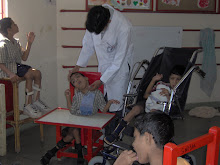While the old fashioned house calls by medical practitioners are becoming a thing of the past, the future of dentistry seems to be moving towards a mobile practice. A domiciliary dentist carries her whole kit in a portable suitcase size cart and is able to offer care to the the old, infirm and socially awkward. DCSN looks at the field of domiciliary dentistry and how it could change the way you view and maybe practice dentistry.
What is domiciliary dentistry?
The term domiciliary means in a domicile or literally "at home". Domiciliary oral health care is defined as a service to reach out to those who cannot reach a service themselves (1) The British Society for Disability and Oral Health includes all preventive procedures under this definition but does not include screening procedures.
Is domiciliary dentistry a charitable act or can it be a viable practice option?
Traditionally, due to the high startup costs and the poorly defined/assessed needs domiciliary dentistry has been associated with teaching hospitals and charitable institutions. An excellent review of the needs, standards and expectations form an institutionalized approach to domiciliary dentistry can be found at the following link. http://www.bsdh.org.uk/guidelines/BSDH_Domiciliary_Guidelines_August_2009.pdf
The field of domiciliary dentistry is perhaps the most advanced in the United Kingdom where the providers of domiciliary dental care now include a large number of private practices.
Who are my patients and am I qualified
Fiske and Lewis (2000) have shown that while domiciliary dentistry is usually carried out by hospitals and community clinics any general practitioner can provide domiciliary care if she wishes to do so. Further more they go on to describe the patients or "client groups" that are in need of domiciliary care
Client Groups
1) People with the following
- Physical disabilities that cause difficulty in mobility
- Learning disabilities such as autism
- Mental health problems such as Alzheimer's disease and agoraphobia
- Dental Anxiety and phobia
- Medical Conditions such as chronic obstructive airway disease or emphysema
2) People in the following environments
- Hospitals
- Palliative care units
- Hostels for homeless people
3) Any other individuals whose circumstances prevent them from accessing the dental surgery
Getting Started
Identify your patients
Before you decide to get into domiciliary practice decide what type of patients you are comfortable treating. The domiciliary dentist must be comfortable with the very old, the very young and the intellectually disabled. If you cannot deal with such patients or if you are uncomfortable with procedures like making a complete denture then domiciliary dentistry is not for you.
Limit your domiciliary treatment
While it may seem tempting to offer comprehensive care at the patient's doorstep, it is important to know what your limitations. It is better to offer preventive and simple restorative care and then allow for more complicated procedures if the case is suitable rather than promising a plethora of attractive treatments that you cannot deliver.
The Domiciliary Kit
While the dentist may choose to make her kit more elaborate the basic domiciliary kit must contain the following
- Instruments and other material required for the procedure
- Local anaesthetic syringes and cartridges
- Examination and surgical gloves, protective eyewear and masks
- Hand soap and alcohol based hand disinfectant solution
- Surface disinfectants
- Sack for hazardous waste
- Sharps' box
- Impression materials and mixing kit
For more information on any of the above you can visit the embedded link
The Check list
Before you set off on the visit make sure your kit has the following
- Sterilised instruments contained in lidded trays or clear-view sealed sterile pouches
- Sterilised hand pieces (if required for the procedure)
- Sheathed anaesthetic needles
- Gloves (3 pairs minimum)
- Goggles x 2
- Masks x 3
- Mild liquid soap
- Alcohol based hand rub
- Disposable paper towels
- Plastic waste disposal bag x 2
- Heavy duty orange hazardous waste disposal bag
- Puncture proof trays to return syringes and needles in
- Gauze to cover impression with
- Sealable plastic bag for impression to be placed in
Be Prepared for an emergency
As with any procedure in special care dentistry the domiciliary dentist must be prepared for an emergency.
- Contact the patient's physician - patients often lie, hide or simply forget to mention their medical history(especially when it is related to an "embarrassing" condition like mental illness). When a patient visits your clinic this may be an annoying inconvenience, but when you are visiting the patient's home this may prove fatal. Contacting the patient's physician personally not only helps you check on the medical facts but also helps you ensure that he/she is on call when you are performing your procedure.
- Emergency drugs - Most guidelines on domiciliary dentistry state that the visiting dentist carry oxygen and other essential emergency drugs. for a full list click on the following link
remember emergency drugs are useless if you do not know how to use them
Personal Precautions
While domiciliary dentistry is a rewarding act, the dentist must take some basic precautions to ensure her safety and the safety of those working with her.
- Never make a visit alone - this is one part of the profession where "going solo" is not advisable. Always make the call with a co-worker.
- Tell someone at the office where you are going and how long the procedure is likely to take. this way they can contact you after the time stated and inform the authorities if they suspect a mishap.
- Check out the neighbourhood you are visiting and make sure it is safe.
- Take the mental history of the patient seriously, if the patient has a history of violent behaviour, make sure that other family members of the patient are present while you are performing the procedure. Try to take an extra assistant along in such instances.
Being away from your clinic is no reason for not following standard infection control protocols. While certain procedures may not be possible in a domiciliary setting here are a few considerations that should never be compromised on.
- Do not sterilize your instruments at the location - very often dentists may be tempted to "steam" their instruments at the patient's house. This is not only an ineffective means of sterilization but also allows the patient to raise doubts about the sterilization of instruments.
- Do not clean your soiled instruments at the patients house. The dirty instruments must be placed in a bag which you can then carry back to the office and sterilize.







No comments:
Post a Comment